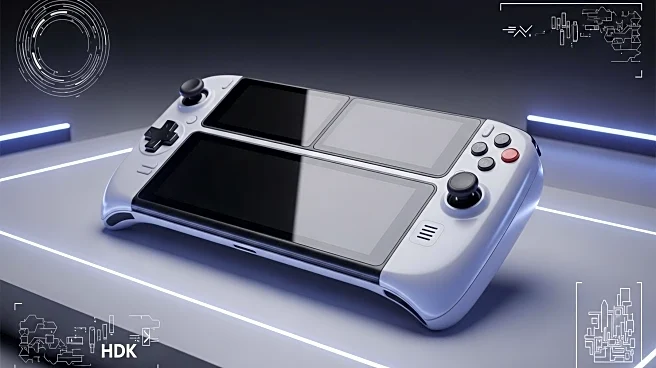What's Happening?
Anbernic, a company known for recreating iconic gaming handhelds, has announced a new product, the Anbernic RG DS, which is a modern-day clone of the Nintendo DS. The device is set to be priced under $100, making it cheaper than the original Nintendo DS, which had an MSRP of $149.99. The RG DS will be available in four colorways: black/red, teal, white, and transparent. Anbernic has hinted at the inclusion of a new chip in the device, although specific details have not been disclosed. The company has not yet announced a release date, but typically begins sales shortly after initial reveal videos. This new product will compete with other handhelds like the Ayn Thor, which starts at $250.
Why It's Important?
The introduction of the Anbernic RG DS at a competitive price point could significantly impact the gaming market, particularly in the handheld segment. By offering a device that is more affordable than its competitors, Anbernic may attract budget-conscious consumers and retro gaming enthusiasts. This move could also pressure other companies to reconsider their pricing strategies for similar products. Additionally, the RG DS's release comes at a time when tariffs on Chinese goods, including electronics, are affecting U.S. imports, potentially influencing the availability and pricing of such devices in the American market.
What's Next?
Anbernic's RG DS is expected to enter the market soon, following the company's typical pattern of launching sales shortly after product announcements. The gaming community and potential buyers will be watching closely for the official release date and further specifications. The impact of tariffs on Chinese goods remains a concern, as it could affect the distribution and pricing of the RG DS in the U.S. market. Stakeholders, including consumers and competitors, will likely monitor how Anbernic navigates these economic challenges.
Beyond the Headlines
The release of the RG DS highlights the growing trend of nostalgia-driven products in the gaming industry. As companies continue to capitalize on retro gaming, there may be broader implications for intellectual property rights and the preservation of gaming history. Additionally, the affordability of such devices raises questions about the balance between cost and quality, and how this affects consumer expectations and satisfaction.








